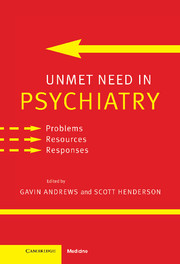Book contents
- Frontmatter
- Contents
- List of Contributors
- Preface
- Part I Unmet need: defining the problem
- Part II Unmet need: general problems and solutions
- Part III Unmet need: people with specific disorders
- Introduction
- 13 The unmet needs of people suffering from schizophrenia
- 14 The early course of schizophrenia: new concepts for early intervention
- 15 Unmet need in depression: varying perspectives on need
- 16 Unmet need following serious suicide attempt: follow-up of 302 individuals for 30 months
- 17 Met and unmet need for interventions in community cases with anxiety disorders
- 18 The unmet need for treatment in panic disorder and social phobia
- 19 Alcohol-use disorders: who should be treated and how?
- 20 Putting epidemiology and public health in needs assessment: drug dependence and beyond
- 21 Why are somatoform disorders so poorly recognized and treated?
- Part IV Unmet need: specific issues
- Part V Unmet need: conclusion
- Index
21 - Why are somatoform disorders so poorly recognized and treated?
from Part III - Unmet need: people with specific disorders
Published online by Cambridge University Press: 21 August 2009
- Frontmatter
- Contents
- List of Contributors
- Preface
- Part I Unmet need: defining the problem
- Part II Unmet need: general problems and solutions
- Part III Unmet need: people with specific disorders
- Introduction
- 13 The unmet needs of people suffering from schizophrenia
- 14 The early course of schizophrenia: new concepts for early intervention
- 15 Unmet need in depression: varying perspectives on need
- 16 Unmet need following serious suicide attempt: follow-up of 302 individuals for 30 months
- 17 Met and unmet need for interventions in community cases with anxiety disorders
- 18 The unmet need for treatment in panic disorder and social phobia
- 19 Alcohol-use disorders: who should be treated and how?
- 20 Putting epidemiology and public health in needs assessment: drug dependence and beyond
- 21 Why are somatoform disorders so poorly recognized and treated?
- Part IV Unmet need: specific issues
- Part V Unmet need: conclusion
- Index
Summary
Introduction
Although somatic forms of distress are of considerable epidemiological significance, impact adversely on health care utilization, and result in considerable economic, social, and personal burden, they occupy a rather minor place in much clinical psychiatry research and teaching (Hickie, Scott & Davenport, 1998). There is ongoing debate about appropriate nomenclature, the role of genetic, psychosocial, cultural and neurobiological factors in etiology, and the efficacy of specific pharmacological and behavioral interventions (Bass, 1990; Escobar, 1997; Hickie, Hadzi-Pavlovic & Ricci, 1997; Hickie et al., 1998; Kleinman, 1987; Mayou, 1993; Pilowsky, 1991). Despite these difficulties, the most striking feature of many of these disorders in medical settings is their impact on patterns of health care utilization and doctor–patient interactions (Clements, Sharpe, Simkin, Borrill & Hawton, 1997; Gureje, Simon, Üstün & Goldberg, 1997; Kroenke et al., 1997). As long as doctors remain ill-informed about the significance of somatoform disorders and appropriate forms of intervention, they will continue to result in high levels of disability. In this chapter the nature of somatization will be explored, the epidemiology described, and research and clinical issues outlined.
Medical assessment processes
When patients present with common or unusual somatic symptoms, the immediate response of general medical practitioners is to determine whether such symptoms may be readily explained by a ‘physical’ pathology. While this approach is understandable, it tends to be associated with a premature narrowing of the medical practitioner's perspective. An overly medical approach, particularly towards non specific symptoms such as tiredness, headaches, sleep disturbance and aches and pains, tends to exclude the possibility that psychological distress may give rise to these phenomena.
Keywords
- Type
- Chapter
- Information
- Unmet Need in PsychiatryProblems, Resources, Responses, pp. 309 - 324Publisher: Cambridge University PressPrint publication year: 2000
- 4
- Cited by

